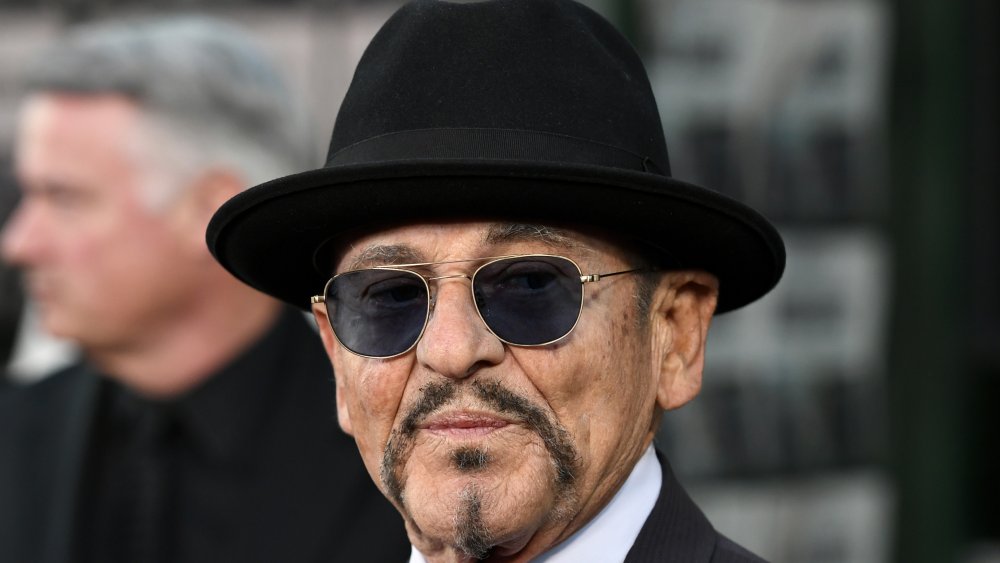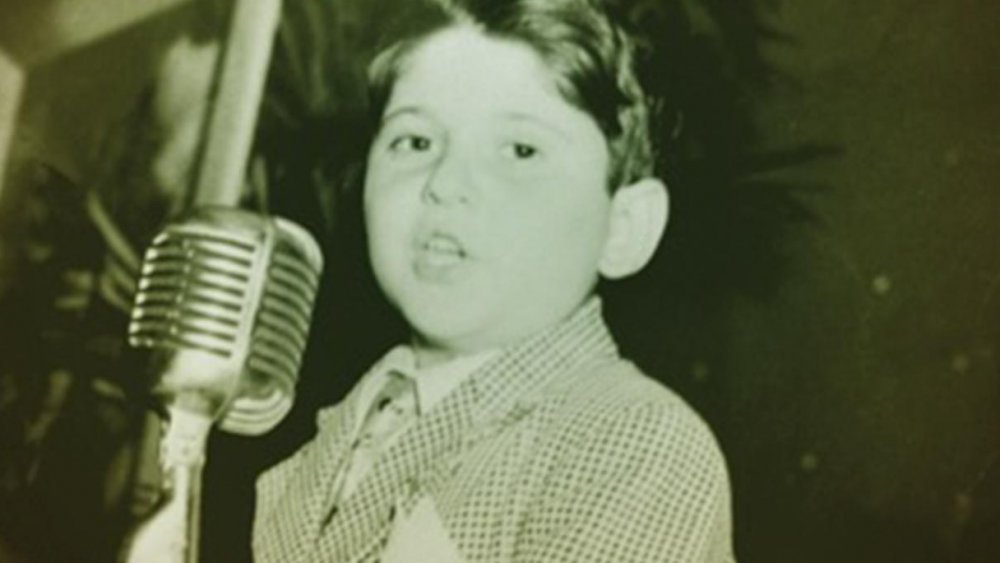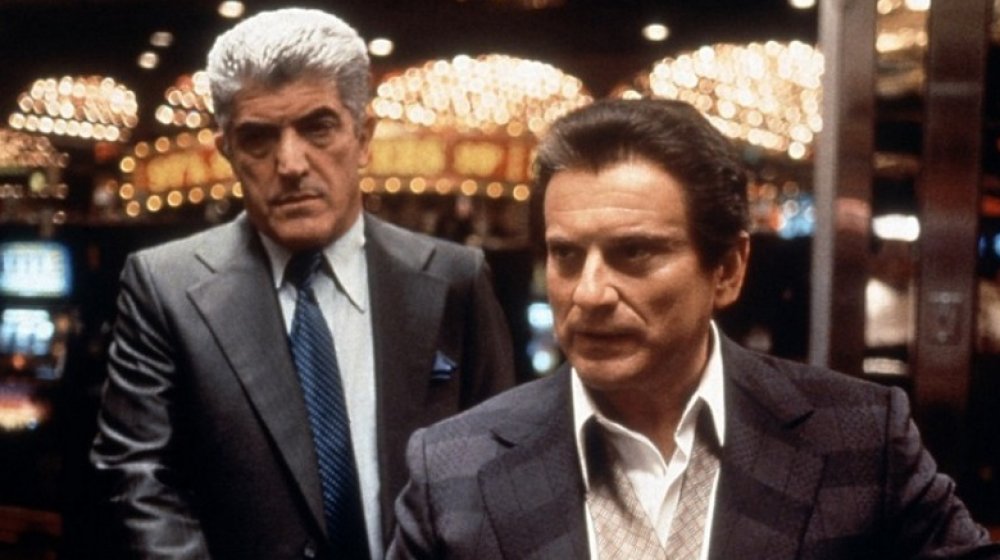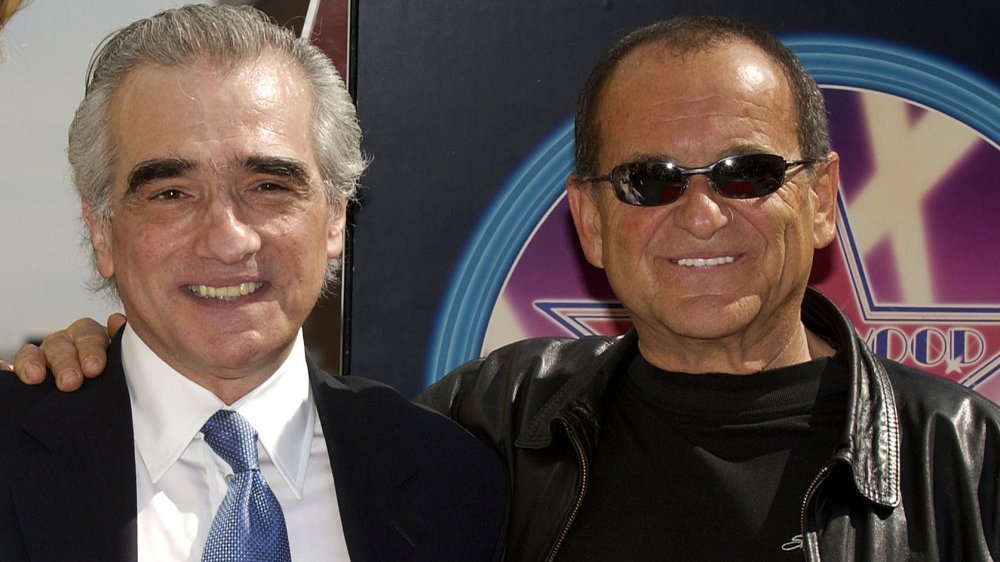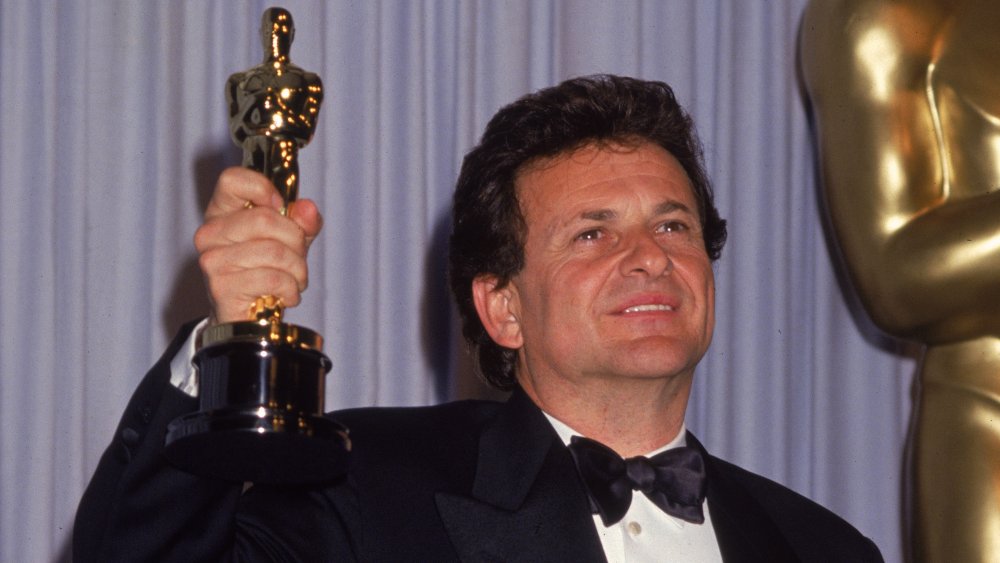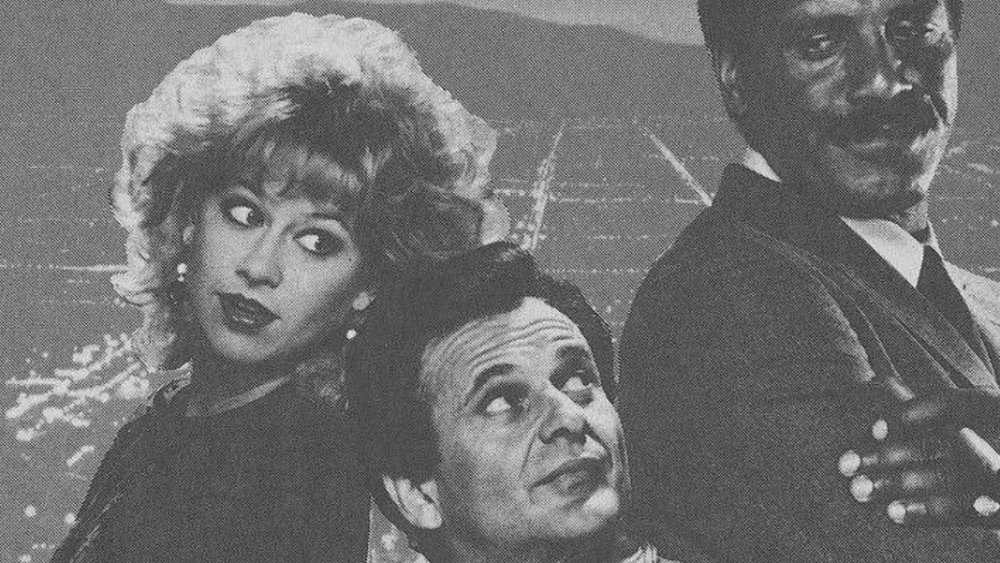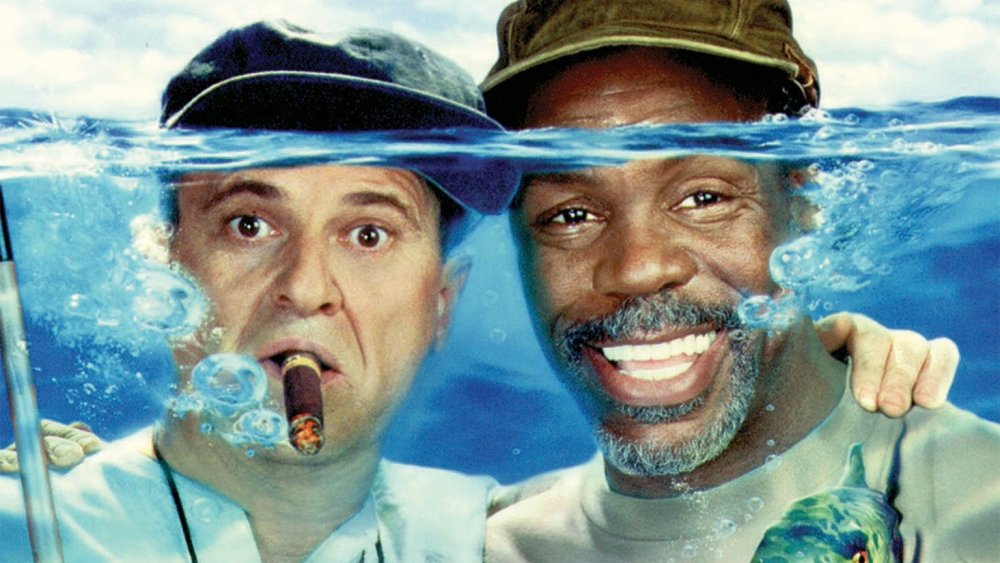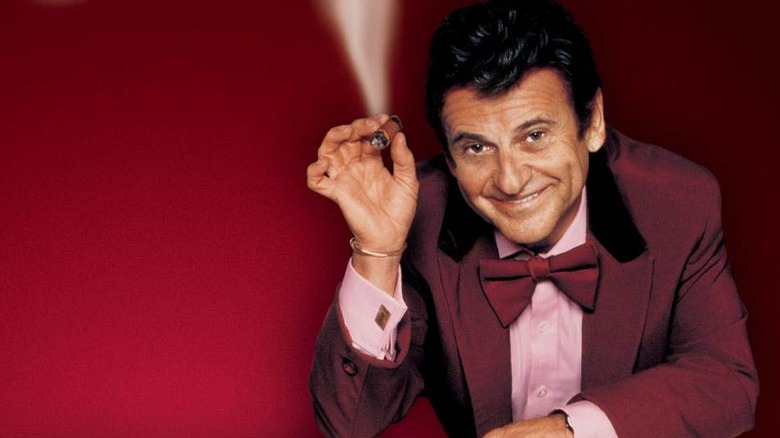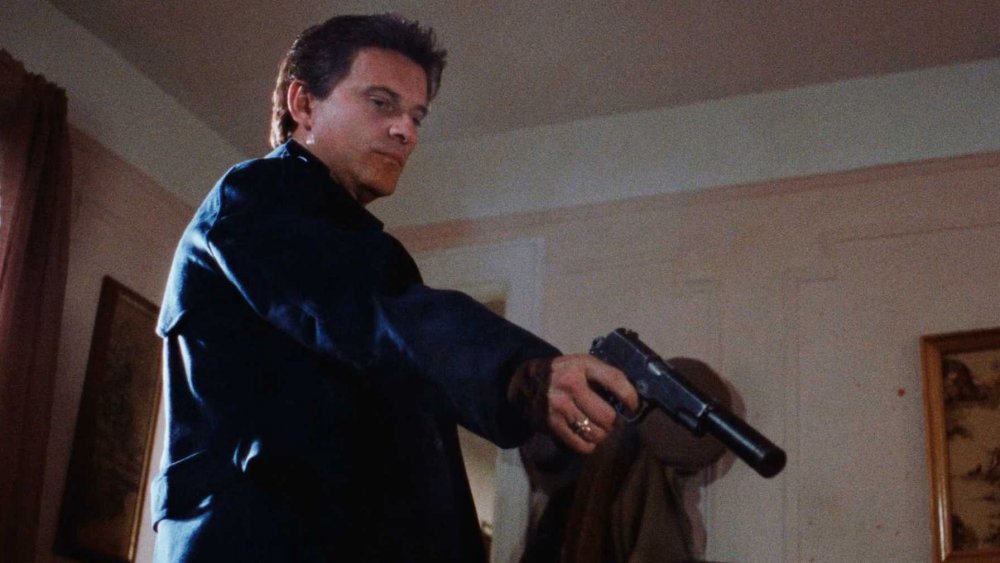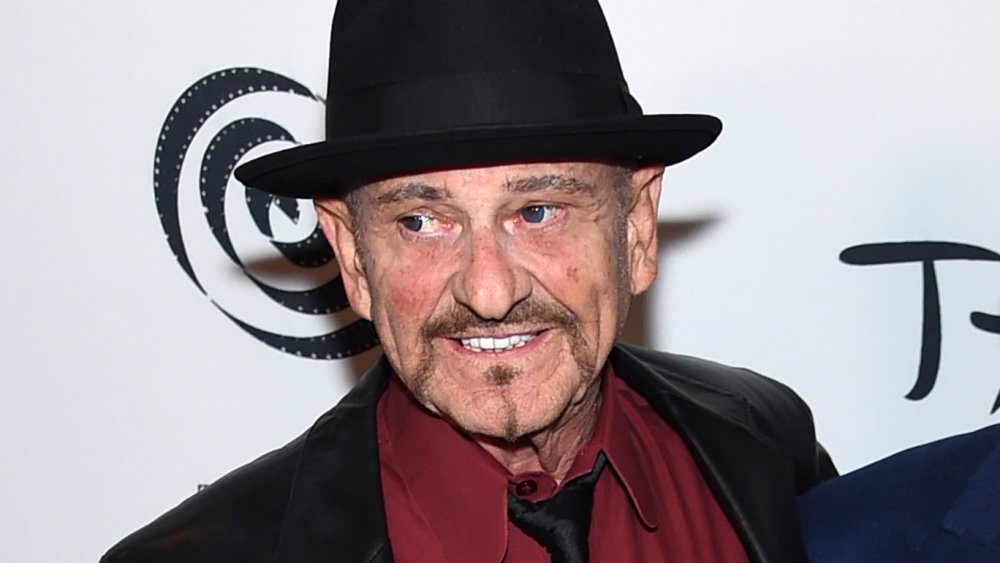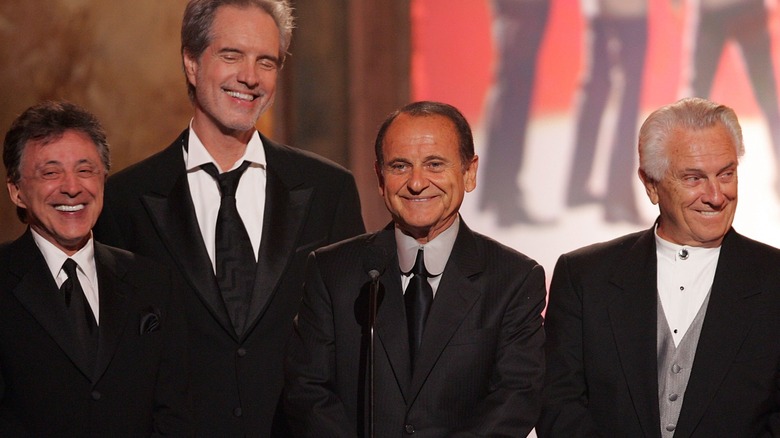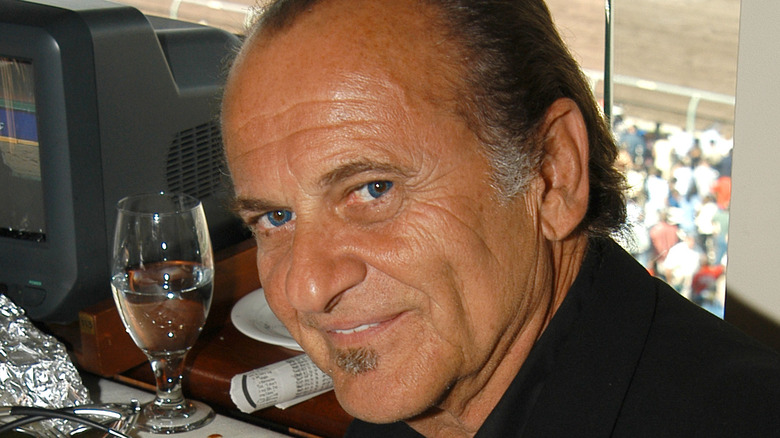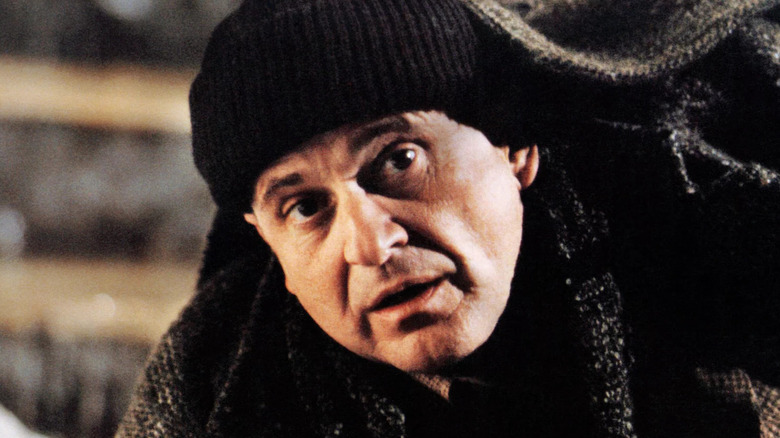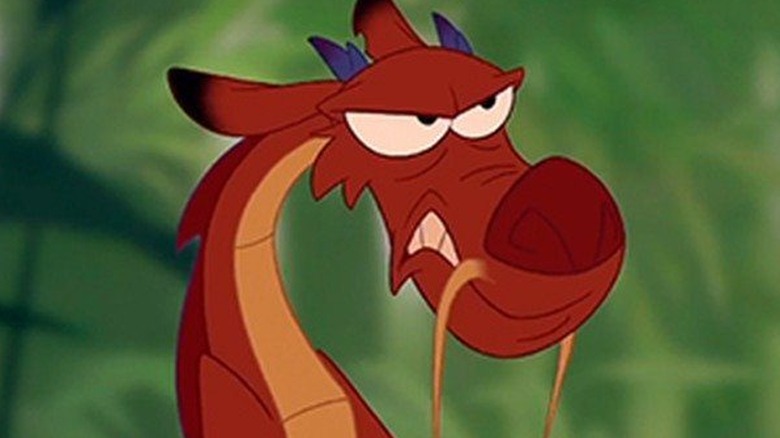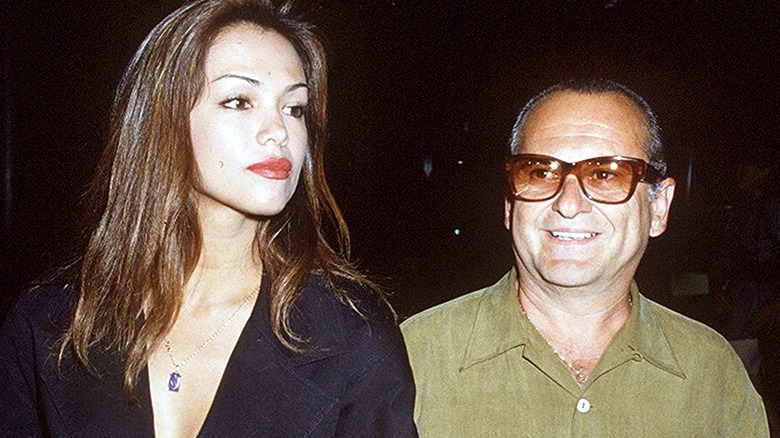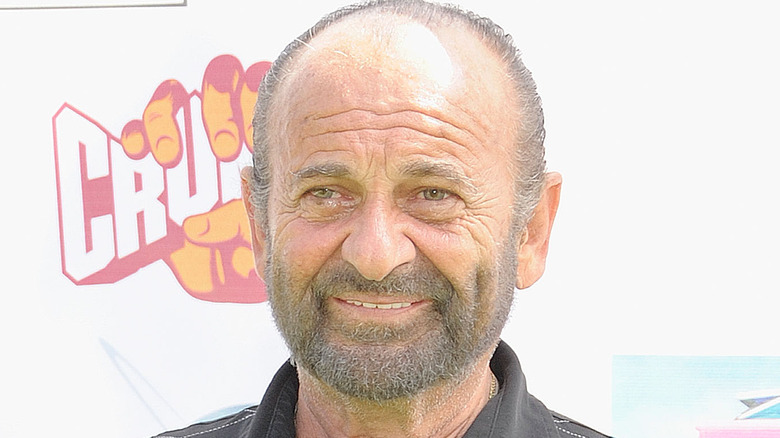The Untold Truth Of Joe Pesci
"A mystery wrapped in a riddle inside an enigma" is not only one of the most memorable quotes from Oliver Stone's "JFK" but also an apt description for the actor who delivered it: Oscar winner Joe Pesci. Anyone who's been to the movies in the last four decades "knows" Joe Pesci from his most memorable screen performances: streetwise, fast-talking, and volcanic-tempered ("Am I a clown?") in films like Martin Scorsese's "Raging Bull" (1980), "Goodfellas" (1992) and "Casino" (1995), irascible and tenacious in "Home Alone" (1992) and the "Lethal Weapon" franchise. Pesci's screen persona is so indelible that it's almost become an adjective: when Snickers wanted an immediately identifiable visual cue to sum up the short fuse that comes with being "hangry," they tapped him.
The problem with "knowing" Pesci through his screen work is that the actor seems to work overtime to be unknown, avoiding not only any comparison to his best-known roles, but also leaving no footprint in the public arena. A notoriously reticent interview who gave what is possibly the shortest acceptance speech in Oscar history, Pesci defied industry expectations by turning his back on Hollywood just as it elevated him to leading man status (admittedly, in lackluster projects like "Gone Fishin'"). At the height of his fame, he retired from acting and focused on what might be the last artistic endeavor anyone would expect from Pesci: music. And even after netting his third Oscar nomination for a "comeback" project — Scorsese's "The Irishman" — Pesci again faded from view after the acclaim, leaving more questions in his wake. Is there any way to unravel the riddle-wrapped mystery of Joe Pesci? Here are a few clues that might shed some light.
Introducing Little Joe
Born Joseph Frank Pesci on February 9, 1943 in Newark, New Jersey, Pesci started his uncomfortable relationship with the spotlight at an early age. His father, Angelo, worked multiple blue-collar jobs, and sought to spare Pesci and his two siblings from a similar future. Show business was seen as their ticket to a better life, and by the time he was five years old, Pesci was performing on stage and on "Star Time Kids," a television variety series that aired on New York's WNBT (now WNBC) from 1950 to 1955.
The experience was, by Pesci's own description, less than pleasurable: in a 1992 interview with the New York Times, he said, "I grew up in the business. I had no choice." He added that he didn't think it was right to be pushed into entertainment, and if given the choice, he would have done something "more calming, in a different area where I did not have to use my emotions."
The total entertainer
Though Pesci was less than enthused about performing, it kept him afloat during his pre-fame days. Pesci sang and played guitar in a string of pop and rock acts, most notably in the touring version of the popular New York act Joey Dee and the Starliters, which provided him with his first feature film appearance as an extra in the band's star vehicle, "Hey, Let's Twist!" (1961). It's worth noting that after Pesci's departure, both Jimi Hendrix and Charles Neville of the Neville Brothers held down his guitar spot in the group.
Pesci then made his bid for solo pop stardom in 1968 with the release of "Little Joe Sure Can Sing!" But the LP, which features Pesci covering songs by the Beatles and Bee Gees in a perfectly acceptable voice (that sounds more than a bit like his childhood friend, Frankie Valli), was not a hit, and he returned to gigging, this time with another Jersey musician, Frank Vincent. But live music on the club circuit was out of fashion in the early '70s, and the pair turned to comedy as a duo, Vincent and Pesci. Decades after they hung up the act, Vincent would remain Pesci's friend off-camera and frequent nemesis on film: Pesci brutalized Vincent in "Raging Bull" and buried him alive in "Goodfellas," while Vincent returned the favor by bashing in Pesci's skull in "Casino."
How to make a mobster
In 1975, Pesci made another bid for fame by co-starring in "The Death Collector" (also known as "Family Enforcer"), a low-budget Mafia thriller with Joe Cortese ("Green Room") and Pesci as strong-arm types for the Mob, and Frank Vincent as their first target. Solid reviews from the New York Times, among others, prompted Pesci to head to Hollywood. But he found few takers there, and by 1978, Pesci was back in New York and working as a manager for Amici, a restaurant in the Bronx.
And it was at this low point that Martin Scorsese and Robert De Niro came calling; the director and star had seen Pesci in "Death Collector" and sought him out to play Joey LaMotta, the brother, manager, and eventual bane of boxer Jake LaMotta's existence. Critical response was overwhelmingly positive for Pesci's performance, and an Oscar nomination in 1981 seemed to all but confirm that he was destined for lasting fame. Or so one would think.
Mr. Wonderful
Think about Joe Pesci's film career for a moment: what immediately comes to mind? The Scorsese collaborations, for sure. "Home Alone," "My Cousin Vinny," and his three "Lethal Weapon" movies. If you're a real movie buff: "JFK," and maybe even "Easy Money." Now take a look at Pesci's credits on IMDb, and you'll see that he worked steadily between "Raging Bull" in 1980 and "Lethal Weapon 4" in 1998. If you're an omnivorous movie watcher, a handful of these might be familiar to you: Pesci had a small role opposite De Niro in the legendary Sergio Leone's last film, "Once Upon a Time in America," and co-starred as (you guessed it) a mobster in the De Niro-helmed "A Bronx Tale."
Many of his credits, however, are most likely to be total obscurities to you. Did you know that in 1983, Pesci starred as a bowling alley owner with dreams of stardom in the West German musical "Dear Mr. Wonderful"? Or co-starred in "Man on Fire" — not the Denzel Washington action thriller, but the 1987 Italian/French film on which it's based? It's most likely that in 1989, you didn't see Pesci's turns as American author John Dos Passos in "The Legendary Life of Ernest Hemingway," or a thinly veiled Weegee, the legendary photographer, in 1992's "The Public Eye."
The takeaway? Pesci's hits are very, very big, and his misses disappear, with little in between.
Half Baked
Pesci has given few, if any interviews since announcing his retirement, so his reasons for the decision remain solely with him. However, it's possible that he simply lost his taste for the projects that were being offered to him. As far back as 1992, Pesci told the New York Times that many of the roles brought to him were "stupid, ethnic Italian parts" with "pizza-pie stupid jokes." And while he mostly avoided that characterization in his film work, Pesci did withstand a barrage of jokes about his height (he's 5'5") in the dismal NBC action-comedy "Half Nelson."
Pesci was top-billed as Rocky Nelson, an NYPD detective who works for a private security firm while trying to launch an acting career. The series, co-created by Glen A. Larson ("Battlestar Galactica"), paired Pesci with former football greats Dick Butkus and Bubba Smith as security team members, "Saturday Night Live" alum Victoria Jackson in scatterbrained secretary/romantic interest mode, and a visibly unwell Dean Martin as himself. At the time of its release, critic David Handler described "Half Nelson" (via Television Obscurities) as '[managing] to leave you feeling both bored and soiled," which undoubtedly helped capsize the series after just seven episodes.
Anything but super
Joe Pesci's Oscar win for his work in "Goodfellas" helped to wipe away any residue from "Half Nelson" or his other early obscurities, and it's likely that he saw the win as the start of a new and improved phase of his career. "I love to star in movies," he told the New York Times in 1992. "But I want to have good roles. It doesn't help to get starring roles in something that's no good. I mean, that will just kill you." And for the most part, that's exactly what happened to Pesci during the 1990s.
Though he netted major box office hits with "Home Alone," "My Cousin Vinny," and the "Lethal Weapon" films, much of his output during the 1990s was dismissed by critics and audiences alike. Attempts to fashion him as a comedic leading man in "The Super" (1991) and "Gone Fishin'" (1997) were busts, as were dramatic turns in the terminally soggy "With Honors" (1994), which cast him as a homeless man with a big heart and a scholar's brain. He even dabbled in fantasy, playing a cartoonish mobster in the surreal Michael Jackson music project "Moonwalker." By 1998, Pesci had clearly lost his patience with the industry: after logging his third and final turn as machine gun-mouthed Leo Getz in "Lethal Weapon 4" — which earned him a Razzie nomination — he retired from acting as a full-time profession and focused his energies elsewhere.
Little Joe sure is back!
For much of the new millennium, Joe Pesci stuck to his decision to put acting on the back burner. There were offers — he was courted by HBO for the ill-fated racing drama series "Luck," but as he told Empire in 2012, "I'm not looking for a job." He instead focused his energies on golf and, to the surprise of many, his first love: singing. In 1998, Pesci released "Vincent LaGuardia Gambini Sings Just for You," his second album and first new recording in three decades. This being a Pesci project, the album is eccentric, to say the least: the title name checks his Cousin Vinny character and features an ill-advised pass at hip-hop with the single "Wise Guy." But again, Pesci proves that he knows his way around standards and club tunes with his renditions of "What a Wonderful World," the jazz standard "I Can't Give You Anything But Love," and a bawdy version of the Ray Charles number "I've Got News For You."
Critics and listeners alike weren't sure if "Sings" was comedy, pop, or jazz, and largely dismissed the effort as a vanity project. But Pesci kept his hand in music, though subsequent releases dropped any pretense of humor. As "Joe Doggs," he earned respectable reviews for Falling in Love Again, a collaboration with jazz organist Joey DeFrancesco, and held his own with his idol, Little Jimmy Scott, on "The Folks Who Live on the Hill," a stately duet featured on the legendary vocalist's final studio album, "I Go Back Home," in 2017. Two years later, Pesci would release his third album to date, "Still Singing," which featured two duets with Maroon 5's Adam Levine, of all people.
A made man?
In a 2016 interview with Milwaukee magazine, comedy legend Don Rickles, who appeared with Pesci in "Casino," said of his co-star, "I think sometimes he believed he was with the Mob. But he got over it." Given Pesci's terrifying performances as gangsters, it's understandable how some might misconstrue him as a made man. And while there are stories of the actor interacting with organized crime elements — according to Ray Liotta, the "Am I a clown?" exchange from "Goodfellas" is reportedly based on a real exchange between Pesci and an actual gangster — he's kept himself out of trouble offscreen. Well, for the most part.
In 2006, Pesci was involved in an alleged assault against an overzealous fan in Florida; according to a police report, he struck a man who ignored his request to refrain from taking his picture. Prosecutors dismissed the allegations over a lack of evidence. A half-decade later, Pesci was involved in not one but two legal cases: the first, in 2012, involved his second ex-wife, actress/model Claudia Haro, who was sentenced to 12 years for allegedly hiring a hitman to rub out her second husband, stuntman Garrett Warren. Pesci was briefly considered as the supposed source of financing for the failed hit, though the allegations were eventually dismissed.
In 2020, Pesci was part of a neighborhood squabble near his home on the Jersey Shore over two property owners' application to extend the docks on their waterfront homes. Pesci lodged a complaint with environmental protection officials, who firmly but politely requested denial of the proposed extension.
So who is this Pesci guy, anyway?
There's no question that Joe Pesci is a complicated individual. Even he's noted as much: in an interview with the Baltimore Sun (via Complex), he recalled feeling what could be described as an existential crisis while playing a game of his beloved golf. "I didn't know who the hell was about to hit that golf ball," he said. "Was it Leo Getz or David Ferry or Tommy or Harry or Joe? I've spent so much time as somebody else, and so little time as myself, I lost sight of who I was for an instant."
Pesci is an enormously talented actor, and if his quietly menacing performance in "The Irishman" is any indication, one still capable of mesmerizing audiences. But he seems to prefer to distance himself from acting and instead focus on other outlets that appear to have a greater hold on his heart, including singing and tending to his own personal well-being. And if acting has left him feeling misunderstood, misrepresented, and even left him unsure of who he really is, it's understandable that he's chosen to step away from it. So what's the untold truth of Joe Pesci? He has his world, and we have ours. And given the choice, Joe Pesci would seem to prefer to remain the enigma, the mystery, and the riddle, all wrapped in one.
He was close with the group The Four Seasons
The Four Seasons were among the most successful Americans pop groups of the 1960s, scoring #1 hits with "Big Girls Don't Cry," "Walk Like a Man," and "Rag Doll," and selling about 100 million albums, according to Broadway World. Formed in New Jersey, the group's prime-era lineup included Frankie Valli, Nick Massi, Bob Gaudio, and Tommy DeVito. Another budding musician named Joe Pesci — who'd later successfully turn to acting — was friends with and worked with DeVito, a guitarist, and he introduced him to Gaudio, primarily a songwriter, thus creating the foundational relationship of the Four Seasons, according to Time.
In 2005, the jukebox musical "Jersey Boys" debuted on Broadway, a musical that told the story of the Four Seasons using the group's own songs. A young "Joey" Pesci is a pivotal character in the show, and he appears in the 2014 film adaptation, too. Actor Joseph Russo plays Joey in the movie, and when another character calls him "funny," he asks, "Funny how?" — a reference to Pesci's "Goodfellas" character, who amusingly was named ... Tommy DeVito.
He once worked as a barber
Joe Pesci's acting career started relatively late. He landed his first speaking role in the 1976 film "The Death Collector" when he was 33 years old. Part of the reason why Pesci's entry into major cinema came at a great delay: He'd enjoyed a successful career as a barber, stylist, and shop owner.
In the late 1960s, Pesci cut hair at Mike's Barber Shop in Belleville, New Jersey, according to Entertainment Weekly. He catered to a primarily male clientele, specializing in the "duck's a**" or "D.A." cut popular at the time, with a short top and long sides. But Pesci's skills and repertoire developed, and in the early 1970s he left Mike's in favor of opening his own hair styling salon in Nutley, New Jersey, called Studio 548. But according to clients of the salon, Pesci's entertainer gifts started to emerge. "Joe would always interrupt the cutting of hair to act out a story or tell a joke," customer Ron DeVito said. "Took a long time to get a haircut, though."
He wanted to do Home Alone 'for the kids'
The film work of Joe Pesci is by and large adults-only material — seriously dramatic, profanity-laced, hard-R-rated dark or violent fare including "Raging Bull," "Once Upon a Time in America," "Goodfellas," "A Bronx Tale," and multiple "Lethal Weapon" movies. There's not a lot in the Pesci catalog designed or appropriate for the whole family, which is a big reason why he signed on to make what would become by far the biggest financial success of his career, "Home Alone." "I wanted to play it for the kids because I never get to work for children, you know?" he told CBC's "Midday" in 1992. "I thought 'Home Alone' was a great script."
In making a movie that kids could enjoy, Pesci approached the material like it was a live-action "Looney Tunes" installment, taking inspiration for his character Harry Lime, the "Wet Bandit" burglar, from easily agitated cartoon villain Yosemite Sam. Like the animated spoof of Wild West scoundrel characters, Harry angrily mutters nonsense, which the actor calls "cartoon cursing," on account of how it's a family-friendly alternative for the actual swear words Pesci frequently uses in most of his other movies.
He nearly voiced Mushu in 'Mulan'
Joe Pesci is already a Hollywood legend for the blockbuster-turned-perennial holiday favorite "Home Alone," and for his Oscar-winning work in "Goodfellas," but he missed out on vocal immortality as the voice of a character in a Disney animated feature film.
In the mid-1990s, Tom Bancroft landed the job of supervising animator of Mushu, a character in "Mulan." Bancroft started working on designs a year before production began on "Mulan," and neither he nor his filmmaker bosses were quite sure what shape Mushu would take. "Mushu at one point was going to be two characters — like two different dragons called Yin and Yang — and they would maybe meld together at the end," Bancroft told Curator, adding that he also considered making Yin and Yang a phoenix and a dragon before ultimately landing on a single dragon inspired by Chinese folklore depictions.
From there, the character's personality and mannerisms developed, leading Disney to consider three actors known for their irascible screen personas and witty line reads: Richard Dreyfuss, Eddie Murphy, and Pesci. It was ultimately up to Disney top executive Michael Eisner, who went with Murphy.
Joe Pesci has been married more than once
One of Joe Pesci's most memorable roles came in the 1995 drama "Casino," playing a brutally violent criminal enforcer. Pesci's real-life experience with Las Vegas was much sunnier. In 1964, Pesci got married in the casino-filled city. "I was 21, and my bride was 18 or 19," he told the Las Vegas Sun. They even met Dean Martin and Frank Sinatra during their wedding trip which doubled as a honeymoon, but the couple ultimately divorced.
But Pesci lived to love again, and in 1988 he married actor and model Claudia Haro (per Britannica), his co-star in "Jimmy Hollywood," "With Honors," "Casino," and "Gone Fishin'" — all of which were released well after the pair's divorce in 1992, the same year Pesci's daughter, Tiffany, was born (per Stanford Arts Review).
Pesci almost got married one more time, and once again to an actor and model. In the summer of 2007, according to Ireland On-Line, Pesci proposed to his partner of seven years and 27 years his junior, Angie Everhart. Nine months later, the engagement was off, and the couple split up entirely.
He's reluctant to act
Joe Pesci may have retired from acting, but he'll occasionally go in front of the cameras, if the terms of the project are just right — specifically if they don't take up too much time or they involve people he likes. Since his so-called retirement, Pesci has appeared in a Snickers commercial, did a cameo for the 2006 film "The Good Shepherd" (starring his frequent collaborator Robert De Niro), acted in the 2010 Helen Mirren drama "Love Ranch, popped up in a "Home Alone" themed ad, and reunited with his "Goodfellas" director Martin Scorsese on the 2019 crime epic "The Irishman."
And there's one more never-completed, ill-fated, post-retirement project that left Pesci more than miffed. According to CBS News, Pesci agreed to a $3 million payday for the role of enforcer Angelo Ruggiero in a biographical movie about the Gotti organized crime family. Ruggiero was a physically imposing man, and Pesci went ahead and gained 30 pounds for the role, only for filmmakers, the actor alleged, to offer a smaller part at a reduced salary. Pesci filed a $3 million lawsuit against Fiore Films in 2011; the case was settled out of court two years later.
